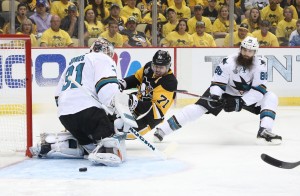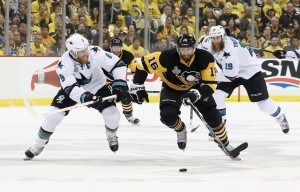The San Jose Sharks continue to be a good hockey team and they are led by the best blueliner in the game today, Brent Burns. Burns has put together a remarkable season. His offensive game is dominant. His defense, once a source of near-constant consternation, has improved dramatically.
And yet, under some very specific, very important circumstances, the Sharks might be better with Burns playing forward.

A recent Sharks loss to the Minnesota Wild was eerily similar to the games in last season’s Stanley Cup Final against the Pittsburgh Penguins. The Penguins were the only team to neutralize Burns in the playoffs.
The Wild’s style of play resembled the Pens’ style. This season, in two games against the Wild, Burns is minus-2 with two points. Against Pittsburgh, Burns is minus-2 with a point. A third team has also given Burns trouble; against St. Louis, Burns is scoreless and minus-2. There are teams who have neutralized Burns.
It is not easy to neutralize him. Few teams have all the needed elements – system, skill and talent – to accomplish this. Against most top teams, Burns has been a force. Against the Capitals this season, Burns has four points and is plus-3. In two games against Montreal, he has two points and is plus-1. And in three games against the Blackhawks, has five points with an even rating. In these seven games against division leaders he has 11 points and is plus-4.
However, a few specific teams have succeeded in slowing down hockey’s most interesting player. If and when the Sharks play these teams in the playoffs, it makes sense to consider a change.
Burns As A Forward
Burns was a force as a forward in the second half of the strike-shortened 2013 season and throughout 2013-14. In his 93 games as a winger, he put up 54 even strength points and was plus-31. The Sharks scored 64 percent of their goals with Burns on the ice, opponents just 36 percent. Transition offense creates high quality scoring chances and an effective forecheck is key to creating the turnovers leading to transition offense. Burns was a highly effective forechecker, as good as anyone in the game.
In the big picture, Burns is more effective and important on defense than as a forward. But a given playoff series is not the big picture; it is singular and narrowly focused.
[irp]
Lessons From The Stanley Cup Final

The Sharks played six games against Pittsburgh last season in the Stanley Cup Final. Pittsburgh played a fast-forecheck style (as opposed to a heavy forecheck), with emphasis on getting pressure on the puck quickly. This is coupled with cutting off the passing lanes. In the defensive zone, the Pens were a fast checking team, which proved especially disruptive to the Sharks’ top forward, Joe Thornton. As a result, the Pens were able to limit the effectiveness of shots from the point, even from Burns.

If there was a lesson (largely unnoticed) from the series, it was how the Sharks were most dangerous. The more powerful forwards were effective if they went to the net. While quickness and set plays were largely ineffective, power moves worked. Many thought Tomas Hertl was the Sharks forward who gave Pittsburgh the most trouble. Hertl used his strength to muscle his way into scoring chances (his shots hit the post three times in Game 2). Alas, he missed the final four games of the series with an injury.
Another player who played like a power forward, at times, was Burns. All three of his even strength points came when he was played as if he was a forward. Once getting a turnover then leading the resulting odd man rush, and twice handling the puck behind the net.
The Sharks’ best counter to the Penguins’ speed game was a more powerful forward group. Once Hertl went down, the Sharks’ offense was rather docile.
Regular Season Planning for Playoff Success
This path for Burns might seem controversial, but it makes sense. Sharks head coach Peter DeBoer can deploy Burns as a forward a few times before the playoffs. Consider it a refresher course on the winger role. Better to do this now than in a playoff series.

The downside of playing Burns at forward for a game or two before the end of the regular season is minimal. The Sharks’ lineup will not suffer, as they have a capable seventh defenseman in Dylan DeMelo (he could use the playing time). DeBoer values internal competition among his forwards, and adding Burns into the mix would up the ante a bit further. And a dinged-up or worn-down player gets an evening off to heal. Even if the Sharks lose these games, they are still making the playoffs. In terms of risk/reward, it is an easy call.
Burns on defense is the right call for the regular season, even against opponents who seemingly have his number. It makes sense to work through the issues in the regular season. The playoffs are different. For the maximum benefit, a decision needs to be made early in a series.
Playoff Challenges
The Sharks’ hopes for a Stanley Cup depend greatly on Burns being effective. Few teams can neutralize Burns as a defenseman, but some have. Come the playoffs, all it takes is one.
Burns is a mismatch almost anywhere he is on the ice. In the playoffs, he should play where he creates the biggest matchup problem for the opponent.

Hindsight says San Jose should have moved Burns to forward against Pittsburgh in last season’s Cup Final. He was most effective when he played like a power forward. With last season’s experience as a guide, the Sharks can recognize the upside potential of a position switch for Burns, should the need arise.
As I see it, Minnesota is the only Western opponent where ‘Burns to forward’ should be a strong consideration. This series won’t happen unless they both make it to the Western Conference Final. And even then, the Sharks could make adjustments which counter the Wild’s effectiveness against Burns.
I consider St. Louis a candidate for the position change, though the case is not as clear. A series against the Blues could happen as early as Round 1.
If a playoff opponent emerges which proves stylistically similar and as highly skilled as Pittsburgh or Minnesota, the Sharks have an option. Moving Burns to the wing forces teams to attempt to defend him in a different manner.
Hockey coaches are stubborn people, but they are paid to anticipate situations. If a team has success neutralizing Burns in the playoffs, DeBoer can ‘flip the script’ by moving Burns to forward. Preparation for this contingency begins in the regular season. Give Burns a few games at forward in the closing weeks of the regular season to re-familiarize himself with the position.
[irp]
Zeke’s Notes
Burns’ recent play deserves scrutiny for a different reason. He has declined at both ends of the ice, most notably in his own zone. To my eyes, it looks like fatigue. Some errors look physical (getting caught flat-footed) while others seem more mental (passing the puck directly to the other team; Scottie Upshall says “thank you”).
Except for the game against Washington, Burns from the past few weeks is not the dominant player who carried the team to the top of the division. In the last nine games of February, Burns generated nine points and was plus-7. In comparison, nine games into March he has four points and is minus-1. A less fatigued Burns, however the staff goes about it making it happen, is good for the player and the team.
Center Chris Tierney is having an up and down season. The five most recent games hint at some of his challenges. Against St. Louis, he won just two of nine face-offs (2/9). It wasn’t any better against Anaheim (0/5) with a similar story against Nashville (1/7). Against teams not headed to the playoffs, it was different; he dominated against Buffalo (11/14) and won half his draws against Dallas (6/12). Tierney is a capable player, but his fourth line needs to begin more possessions with the puck to be effective, especially against tougher competition.